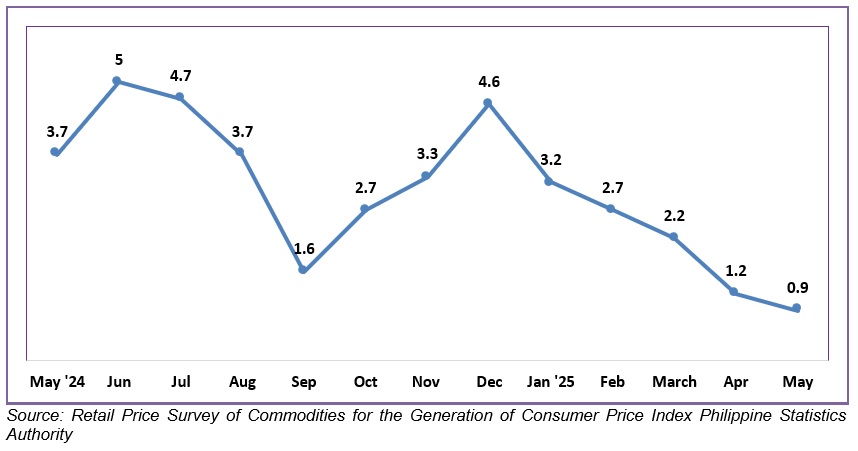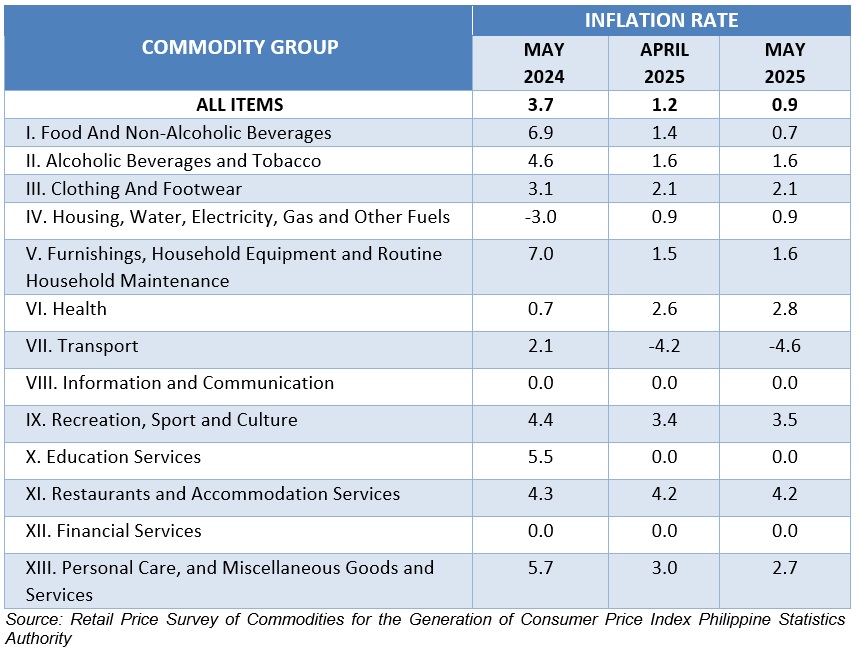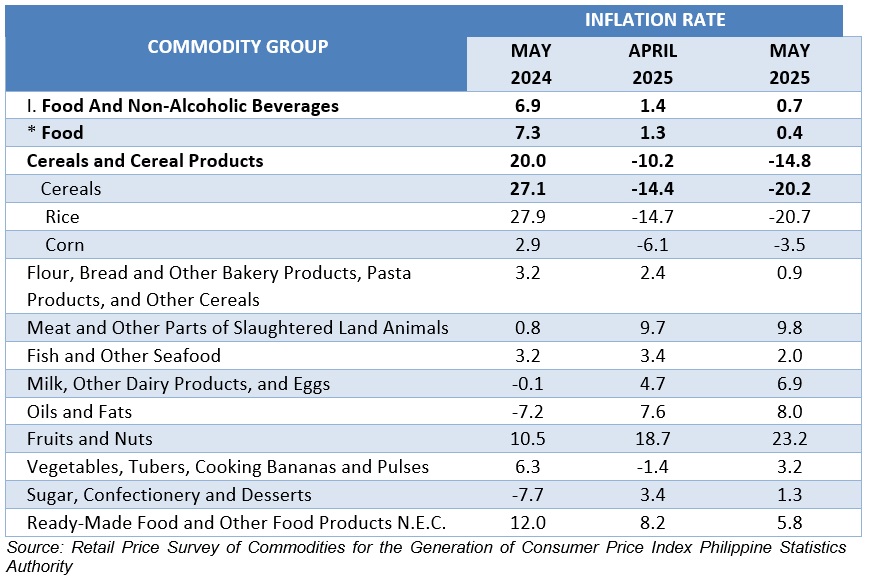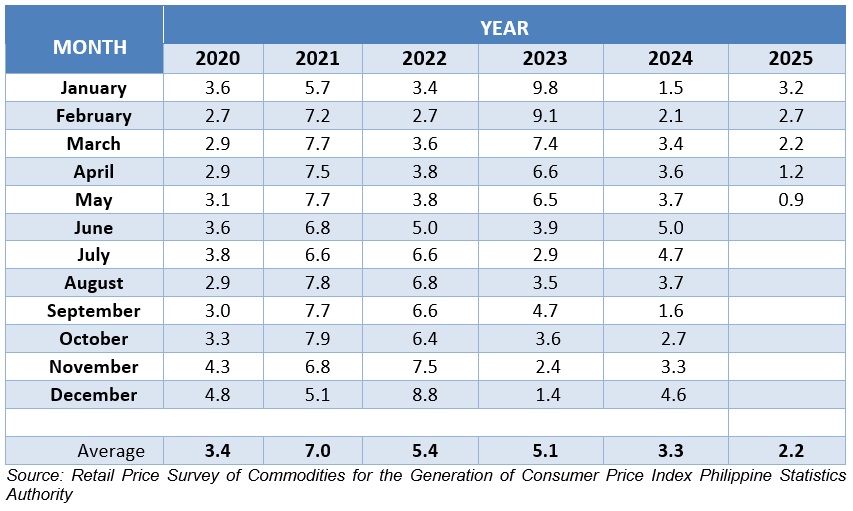Figure 1. Inflation Rates, Nueva Vizcaya, All Items
(2018=100)
The year-on-year headline inflation rate in Nueva Vizcaya decelerated to 0.9 percent in May 2025 from 1.2 percent in the previous month. Also it decreases by 2.8 percent from 3.7 percent inflation rate in May 2024.
The average inflation rate of Nueva Vizcaya for the calendar year 2025 (January–May) stood at 2.0 percent.
Table 1. Year-on-year Changes of the Consumer Price Index in Percent
in Nueva Vizcaya by Commodity Group
May 2024, April 2025 and May 2025
(2018=100)
The main drivers in the downward trend in inflation for all income households in May 2025 were as follows: (Table 1)
Food and non-alcoholic beverages,0.7 percent from 1,4 percent;
Transport, -4.6 percent from -4.2 percent; and
- Personal Care, and Miscellaneous Goods and Services, 2.7 percent from 3.0 percent.
In contrary, three (3) commodity groups recorded an upward trend inflation rates in the year-on-year increase of index:
Furnishings, Household Equipment and Routine Household Maintenance, 1.6 percent from 1.5 percent;
Health, 2.8 percent from 2.6 percent;
Recreation, Sport and Culture, 3.5 percent from 3.4 percent.
Meanwhile, seven (7) commodity groups either retained their inflation rates from the previous month or had a zero percent annual rates:
Alcoholic Beverages and Tobacco, 1.6 percent from 1.6 percent;
Clothing and Footwear, 2.1 percent from 2.1 percent;
Housing, Water, Electricity, Gas and Other Fuels, 0.9 percent from 0.9 percent;
Information and Communication, 0.0 percent from 0.0 percent;
Education Services, 0.0 percent from 0.0 percent;
Restaurants and Accommodation Services, 4.2 percent from 4.2 percent; and
Financial Services, 0.0 percent from 0.0 percent.
Table 2. Consumer Price Index for All Income Households in Nueva Vizcaya
May 2024, April 2025 and May 2025
(2018=100)

In food index, the province's inflation rate in May 2025 (0.4 percent) was decreased by 0.9 percent from 1.3 percent in the previous month. And 6.9 percent from 7.3 percent in May 2024. (Table 2)
Main Drivers to the Downward Trend inflation rate on Food Index were the following:
Flour, Bread, and Other Bakery Products, Pasta Products, and Other Cereals, 0.9 percent from 2.4 percent;
Fish and Other Seafood, 2.0 percent from 3.4 percent;
Sugar, confectionery and desserts, 1.3 percent from 3.4 percent; and
Ready-made food and other food products, 5.8 percent from 8.2 percent.
In contrast, five (5) food groups had an upward trend in inflation rates:
Meat and other parts of slaughtered land animals, 9.8 percent from 9.7 percent;
Milk, other dairy products and eggs, 6.9 percent from 4.7 percent;
Oils and Fats, 8.0 percent from 7.6 percent; and
Fruits and Nuts, 23.2 percent from 18.7 percent;
Meanwhile, one (1) food group showed a negative inflation rate:
Rice, -20.7 percent from -14.7 percent; and
Corn, -3.5 percent from -6.1 percent.
On the other hand, Vegetables, tubers, plantains, cooking bananas, and pulses recorded a positive inflation rate (3.2 percent) from a negative inflation rate (-1.4 percent) of the previous month.
Table 3. Year-on-year Rates in Nueva Vizcaya
All Items in Percent
January 2020 – May 2025
(2018=100)

Relative to the trend of the inflation rate during the month of May for the year 2020 to 2025, the province's peak inflation rate occurred in 2021 at 7.7 percent, followed in 2023 at 6.5 percent, while the lowest inflation rate was recorded in this year 2025 at 0.9 percent. (Table 3)
DEFINITIONS AND CONCEPTS
Price -
is the amount or value paid in exchange for the commodity or a service rendered.Retail Consumer Price -
refers to the price at which a commodity is sold in small quantities for consumption.Market Basket -
a term used to refer to a sample of goods and services that are commonly purchased and bought by an average Filipino household.Consumer Price lndex (CPl) -
it is an indicator of the change in the average retail prices of a fixed basket of goods and services commonly purchased by an average Filipino household. lt shows how much on the average, prices of goods and services have increased or decreased from a particular reference period known as base year.lnflation Rate -
is an indicator derived from the CPl. lt refers to the annual rate of change or the year-on-year change of the CPI expressed in percent. lnflation is interpreted in terms of declining purchasing power of money.Weight -
a value attached to a commodity or group of commodities depending on the magnitude of its contribution to the index.Base Period -
a reference date at which the index is equal to 100. Base year is 2018.lndex Methodology -
a Laspeyre's formula: fixed base year and weights.Purchasing Power of the Peso (PPP) -
the measure of how much the peso in the base period is worth in the current period.Percentage Change -
is a simple mathematical concept that represents the degree of change over time. lt is used for many purposes in finance, often to represent the price change of a security.Headline lnflation -
measures changes in the cost of living based on movements in the prices of a specified basket of major commodities. lt refers to the annual rate of change or the year-on-year change in the Consumer Price lndex (CPl).
CHOLLY L. BAYON
Chief Statistical Specialist
